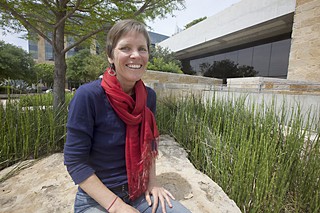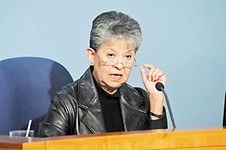City's Urban Ag Effort Struggles to Take Root
Bureaucracy may be reason for program's stunted growth
By Mike Kanin, Fri., April 12, 2013

Local economist Jon Hockenyos is the guy the city of Austin turns to whenever it needs the guts of a fiscal issue examined. On March 28, he told Council members that they'd better start looking to the local food system. In an exchange that illustrates both the level of surprise at the potential impact of the local food economy and its importance, Council Member Laura Morrison picked up on the key message of Hockenyos' report. "Did I hear you say that it is on the same level as our creative (sector)?" Morrison asked.
"Commensurate," Hockenyos replied.
The thing is, the city does have an office charged with growing the local food market, though the office is not easy to find. As one of its first acts, the Sustainable Food Policy Board – a regional entity charged with looking after such things – forwarded a resolution to Council. In it, board members urged Council members to, among other efforts, start the governmental process of developing a sustainable food policy and establish a single point of contact within the city to oversee such a program. Council members approved the resolution in November 2009.
In May 2011, Council members created the position of a sustainable urban agriculture and community gardens coordinator within the city's Parks and Recreation Department, and Jake Stewart was tapped for the job. By that point Stewart was an Austin vet. He'd managed the city's Climate Protection Program until he left in June 2009. He was followed shortly thereafter by a host of other program employees who'd quit, as former Chronicle staff writer Katherine Gregor wrote in these pages, citing "poor team morale, personality conflicts, lack of a strategic direction, and frustration that the program is accomplishing so little."
Former Austin Energy VP Karl Rábago told Gregor at the time that he wasn't surprised by the flight. "The bureaucracy here is numbing. That's annoying to a young person."
And yet, Stewart returned. But he didn't last long. Stewart took several weeks of leave from the end of last year to early this year – an odd break for someone who had returned to the city only three years earlier – and by March 4 he had resigned. In an email addressed to "colleagues and friends," Stewart wrote that he'd "worked long but rewarding hours in trying to create a new programmatic space that worked for the local food system from within the City," but that it was time to move on. "Although it's difficult to leave a program that I have put so much into, I've been given a very unique opportunity to take over a sustainable and innovative 'farmstead,'" he continued. "This affords me the space to integrate and apply many of the sustainable principles that I have dedicated my professional & personal life to. It is also at a scale (~40 acres) that I have longed to work at."
Last week, in an interview with the Chronicle, Stewart sounded concerns that rang with a note of familiarity. "Programs get caught under the weight of – under bureaucratic weight," he said. "It particularly happens with new programs." By the end, he added, he suffered from the sort of "natural frustrations" that he says go with the sort of start-up/governmental hybrid that he tried to establish. His program, he says, started with no budget and grew only slightly in that regard. "In some ways it was good that we were small and nimble," Stewart says. "But at some point you need a budget and you need resources."
Stewart's departure leaves the city with an interesting opportunity – one that would seem to jibe with Hockenyos' study. The chair of the region's Sustainable Food Policy Board is Paula McDermott. She and her fellow board members are staffed by Stewart's former office. McDermott notes that Stewart's former position was housed in the Parks and Recreation Department because that was the city division with, through its community gardens program, some urban agriculture experience. But now, McDermott says, it might be time for a departmental change. "We wanted this position to have a more systemic reach," she said. "This might be a really good time to put this position under Sustainability."
By Sustainability, McDermott means the city's fledgling Office of Sustainability, a seemingly natural fit for a department charged with looking after sustainable agriculture. McDermott says that city officials are currently looking at the idea.
Still, as the Chronicle reported last week ("It's Not Easy Being Green," April 5), the Office of Sustainability has its own problems. Another possible landing spot for the sustainable agriculture role could be within the city's Department of Public Works. That division, known for its relatively massive budget, also boasts a community garden funding operation run through its Neighborhood Partnering Program.
Pat Fuller, who is also in charge of the city's park ranger program, was Stewart's last supervisor in the Parks department. For the time being, he remains in charge of the sustainable agriculture program, which, as of press time, consisted of exactly one employee. Fuller confirms that a review of Stewart's former position is underway. "We're evaluating the job description," Fuller says. "The scope of that job has changed."
According to Fuller, a selection of department heads will meet April 19 to begin discussions about what to do with Stewart's old department. If you believe Hockenyos – and many do – the sustainable agriculture department could play a key economic role in the city's future. But first, to appropriate a Stewart pun, it needs to do a bit of growing.
Council members are set to consider a resolution Thursday that would instruct city management to work with McDermott and her board to "identify and prioritize" the six recommendations Hockenyos offered in his study. These range from a call to look into the establishment of "permanent food market(s), and ... food hub(s)," to the idea of making "vacant lands available for urban agriculture" – something that should be right in the wheelhouse of Stewart's former office.
For more on the growth – and the ups and downs – of the local food economy, see "Communication Breakdown" in this week's Food section.
Got something to say on the subject? Send a letter to the editor.








